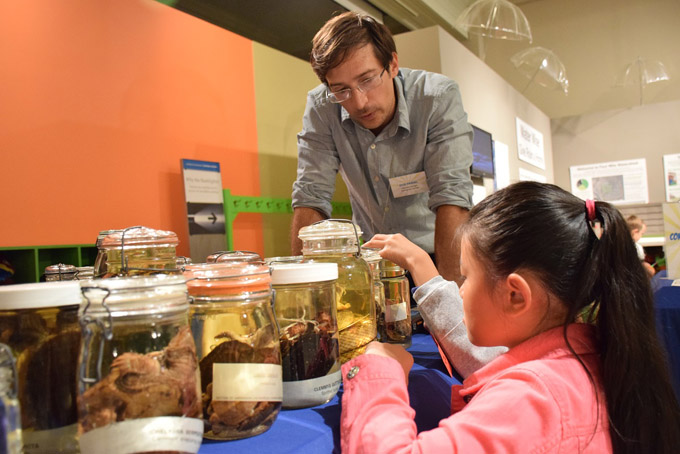
Pittsburgh, Pennsylvania… It’s not every day that amateur fossil hunters, rockhounds, entomologists, botanists, and herpetologists can pick the brain of a renowned scientific expert. On Saturday, September 26, from noon—4 p.m., visitors will be able to do just that when Carnegie Museum of Natural History hosts its second annual Super Science Series: Specimen ID Day. Amateur collectors will have a rare opportunity to interact one on one with the museum’s knowledgeable experts on their rock, fossil, plant, insect, mammal, bird, mollusk, and anthropological finds.
Last September the first ever Specimen ID Day brought hundreds of visitors, some carrying shoeboxes of rocks under their arms, others cradling animal bones in plastic bags or sharing photos on smartphones—all seeking out the expertise of the museum’s scientific staff to ask: What is this? Visitors learned details about their objects that they had never even considered. One visitor, lugging a large rock that his grandfather had found in Wyoming nearly 100 years ago, found out that it was actually a portion of a fossilized sauropod femur.
Carnegie Museum of Natural History has set the following guidelines for bringing specimens into the museum:
- Bring insect and plant specimens in a clear, sealed container or plastic bag
- Bring photos and sound recordings of specimens
- Do not bring in live or recently deceased mammals, reptiles, amphibians, or birds
- Do not bring birds’ nests, bird eggs, bird bones, or feathers. Federal law prohibits possession of any migratory bird specimens
- Plan to take your specimens home with you
Specimen ID Day is to identify specimens for amateur collectors; certifications of authenticity or appraisals will not be given.
All activities in the Super Science Series are free with museum admission. Carnegie Museums of Pittsburgh members always visit free. Become a member to participate in super science every month!
Super Science Series at Carnegie Museum of Natural History is sponsored by The Pennsylvania Cyber Charter School.
Carnegie Museum of Natural History, one of the four Carnegie Museums of Pittsburgh, is among the top natural history museums in the country. It maintains, preserves, and interprets an extraordinary collection of 22 million objects and scientific specimens used to broaden understanding of evolution, conservation, and biodiversity. Carnegie Museum of Natural History generates new scientific knowledge, advances science literacy, and inspires visitors of all ages to become passionate about science, nature, and world cultures. More information is available by calling 412.622.3131 or by visiting the website, www.carnegiemnh.org.
